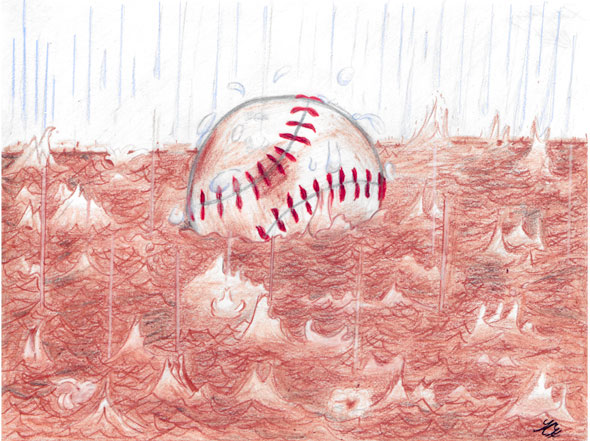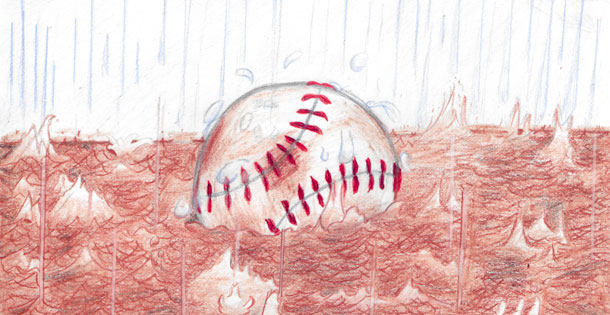
Against the background of the bleachers, the rain, heavy at times, is nearly invisible. Water collects in the depressions of the tarpaulin that covers the infield, its impact creating the illusion that the raindrops are boiling up from beneath the surface of the puddles. Storm clouds, dark and bulbous from a lifetime of drink, hover over Fenway Park, belying the forecast for clearing weather posted on the scoreboard. Fans crowd the upper grandstand seeking shelter, but a few, bright red in newly purchased Red Sox ponchos, huddle in the lower boxes, the expensive seats. In the bleachers, college students stripped to the waist celebrate the end of exams by playing volleyball with giant beach balls, as much a part of baseball at Fenway Park as hot dog and peanut vendors. Bounced from section to section, the beach balls bring to the games a sense of humor more welcome than the mindless wave that begins in the corner of the centerfield bleachers and circles the stands for a time or three before dying to the relief of everyone except the young and the drunk. During the games, the ushers, older men working to supplement Social Security, deliver the beach balls to the Red Sox bullpen where one of the relievers eggs on the crowd by puncturing the beach balls with a groundskeeper’s rake.
Beach balls often invade the box seats where Malone sits, season tickets, but only the day games because Malone believes baseball should be played in daylight and on natural grass. The night games he sells. Malone’s seats align with home plate between a right-handed batter and the catcher, perfectly positioned to see curve balls break, splitters sink, to hear the explosion of fast balls in the catcher’s mitt. Nothing better than the sound of a fast ball when the pitcher’s throwing heat.
The grandstand overhangs Malone’s seats by two rows and the rain only douses them when a strong wind blows in from right field. Today, so far, Malone and his oldest son, Teddy, named in homage to Ted Williams, remain dry. A few rows in front of them, a hot dog vendor sets up on an empty seat. Fans rush down from the upper grandstand. People love to eat during a rain delay, and the easy sales are worth the damp shoulders. Teddy, soon to be 17, buys two for each of them, paying out of his own pocket, his earnings from a part time job, a sign of the shifting relationship between father and son from dependency to whatever.
Malone misses the 6-year-old he coached at T-ball. He never appreciated how hard a game baseball was to teach until he coached Teddy’s T-ball team. Malone taught himself by playing pick-up games in the park and schoolyard, eventually learning enough to pitch for his eighth grade intramural team. Teddy went further, making his high school team as a starting outfielder. It’s this Teddy, the Teddy who has such a strong sense of himself, who tempts Malone to speak. Years earlier, when the cancer was diagnosed, excised, re-excised, Teddy was too young to be told; now, five years later, the window of highest risk having closed without a recurrence, statistics favor Malone’s survival. Even the great Ted Williams made outs 65 percent of the time.
Malone would have hidden this from Teddy but for the newspaper article his wife clipped and left on the kitchen table. Researchers had isolated a gene that makes some people more susceptible to cancer than others. If it’s genetic, it’s inheritable, and Teddy or his brother or sister might carry that gene, might transmit it to their own children. Slipped my mind, Malone imagines himself saying years later when one of his grandchildren is diagnosed and Teddy or one of his other children calls him on it.
On the scoreboard screen, the history of the Red Sox flashes; the sound is too muddied to be understood, but not the images, the successes of the early years of the 20th century, the failures of ’46, ’67, ’75, ’86. The triumph of 2004 is in the future. A fortuneteller once told Malone 2004 would be the year. When he asked if he would live to see it, the crystal ball fogged up.
Malone makes small talk with the people from Salem on his right, those from Holyoke on his left. Their row, seven seats, has been together for several seasons, and Malone with the middle seats shares a friendship with both that is lubricated by anonymity. Yet the Holyokes and the Salems remain strangers to each other, Malone a wall rather than a bridge. For the Holyokes, Malone senses the ballplayers have replaced the children now out of the house as the glue holding together the marriage and he is especially cheered to see husband and wife each opening day. The scoreboard repeats the weather forecast promising clearing weather, restates the teams’ commitment to play the game, thanks the fans for their patience.
For Malone, baseball unites. Skipping back and forth from his side of the family to his wife’s, five generations suffering with and rooting for the Red Sox. The first two came from the old country, born into a world where baseball didn’t exist, buried out of one where it was a religion. Family apocrypha blames the Red Sox for the death of Teddy’s grandmother’s grandmother on his mother’s side who died of heart failure while listening to the radio broadcast of the Red Sox losing the ’48 playoff to Cleveland. Teddy laughed at that story, but Malone’s wife, seething as if the story were about her mother instead of some distant relative she never met, insisted it was coincidence. For Malone, coincidence is an excuse, not an explanation. Otherwise, the newspaper article coming so soon after the closing of the five-year window could be dismissed as coincidence as well. Life, like baseball, is a game of inches, not a game of random chance. Only the rain, nearly invisible, is real.
“You know,” Malone says, softly so the Holyokes and the Salems won’t overhear, “there was a newspaper story this week that says some researchers think cancer is genetic.”
Teddy licks the mustard off his lips. “Mom told me.” He waves at the ice cream man.
Malone stares at his feet while Teddy eats his ice cream and kicks at the mound of peanut shells beneath his seat discarded by the people in the row behind him.
Teddy licks the wrapper clean. “What’re you saying, Dad? That DNA is destiny and I’ll get cancer ’cause you got it?”
Whatever hope for the future that came with Teddy’s buying the hot dogs washes away with the rain. Malone wishes the rain would stop, the game would start, lightning would strike the centerfield flagpole, anything. He stands, stretches, peels the seat of his pants away from his buttocks. Teddy looks up at his father like he did the summer Malone taught him how to hit live pitching. “Keep your eye on the ball,” Malone said over and over. Now, Teddy does. On the field, a member of the ground crew inspects the outfield with the umpire crew chief. Their footprints fill with water, a sure sign the game will not start even if the rain stops. To Malone’s left, the Holyokes offer farewells, expressing confidence the sun will shine for tomorrow’s game.
“Maybe they have the right idea,” Malone suggests.
“Your call, Dad.”
The rain delay drags into a second hour. The hot dog vender runs out, departs, returns with a fresh supply. In the bleachers, the college students, still naked to the waist, continue to punch beach balls back and forth over an invisible volleyball net. For some, the rain is a celebration.
Read More Contemporary Fiction
Become a Saturday Evening Post member and enjoy unlimited access. Subscribe now




Comments
Stuart Liss is as masterful as John Updike when writing from direct experience, as he has shown in this insightful and poignant story of father and son bonding at a baseball game. I have read most, if not all his stories, and I consider this one of Liss’s best.
Thanks for the baseball-clothed story. It brought back memories of sitting in Fenway, watching the Red Sox with my son Jeremiah.